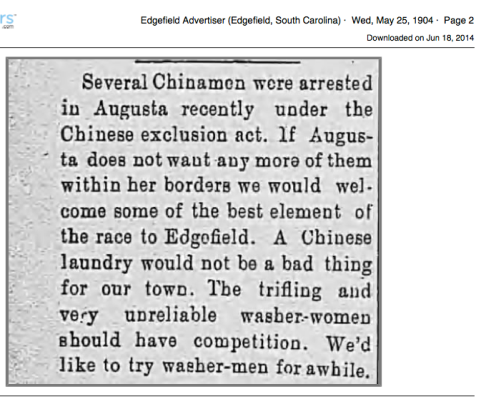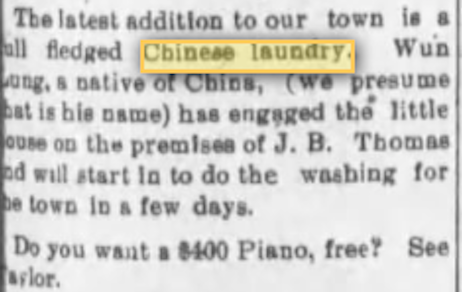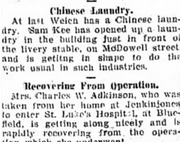In 1879 at a time when Chinese and their laundries were generally reviled across the U. S. and Canada, there were places which welcomed them. For example, in Milan, TN., the local paper opined how welcome a Chinese laundry would be and hoped one would come to town.
 After the 1882 Chinese Exclusion Law passed, illegal Chinese were subject to arrest and deportation. When some smuggled Chinese laundrymen in Augusta, GA. were apprehended in 1904, people in nearby Edgefield, SC. were encouraged by the hope that some Chinese laundrymen would come to their community to replace their “very unreliable” washer-women
After the 1882 Chinese Exclusion Law passed, illegal Chinese were subject to arrest and deportation. When some smuggled Chinese laundrymen in Augusta, GA. were apprehended in 1904, people in nearby Edgefield, SC. were encouraged by the hope that some Chinese laundrymen would come to their community to replace their “very unreliable” washer-women
Edgefield soon got its wish, but didn’t need to have one of the Chinese dispatched from Augusta. The news was that John Wing, of Savannah, an experienced laundryman of 17 years had already ordered improved machinery for the opening of Edgefield’s first Chinese laundry shortly.
 Madison, Florida welcomed “a full fledged Chinese laundry” operated by “Wun Lung” (supposedly his name) from China scheduled to open in a few days.
Madison, Florida welcomed “a full fledged Chinese laundry” operated by “Wun Lung” (supposedly his name) from China scheduled to open in a few days.
In 1914, Welch, West Virginia, was delighted to “at last” have Sam Kee open a Chinese laundry next to the livery stable.
In 1884, just after the Chinese Exclusion law went into effect, Winston (later, Winston-Salem) NC was eager to have a Chinese laundry so that it could show what an ethnic diversity they had, according to a newspaper report in the Weekly Raleigh Register. The article showed that Winston already had “Canadians…Jews… Indians… but lacked “the pig-tailed celestial.”
 They could also have bragging rights if they had the first Chinese laundry in North Carolina.
They could also have bragging rights if they had the first Chinese laundry in North Carolina.
Although Chinese laundrymen were being driven out of western states at the end of the 19th century, they increasingly moved to the South and East in search of better places to set up business which welcomed them, even if for questionable motives.


